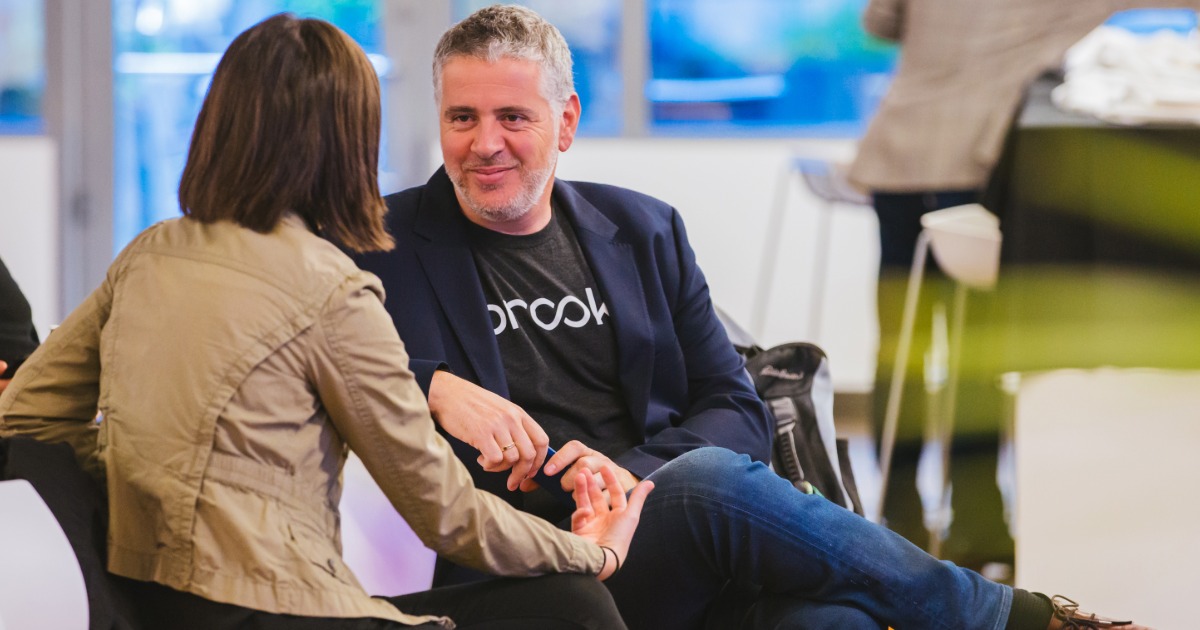Jonathan Bush, former ambulance driver, founder of birthing centers in San Diego, and co-founder and CEO of athenahealth, a public company valued at nearly $5 billion, can add author to his list of achievements. He wrote Where Does It Hurt?: An Entrepreneur's Guide to Fixing Health Care (Portfolio Hardcover), with Stephen Baker, a former BusinessWeek reporter turned novelist.
Bush admits to a few qualms about his storytelling debut. He was apprehensive about the reception. But he needn't have been. Some big name authors said they loved it, and judging from the reviews on Amazon, many others appreciate it too.
The book is an indictment of U.S. healthcare as we know it today. It's also about innovation, a reimaging of healthcare and an account of Bush's beginnings in business. Of course, it includes U.S. Chief Technology Officer Todd Park, who, along with Bush was co-founder of the birthing centers as well as athenahealth. The book is funny, thought provoking – even inspiring.
 It inspired the House Energy and Commerce Committee to invite Bush to Capitol Hill to participate in the 21st Century Cures Roundtable on digital healthcare on June 24. And, one of the book's chapters inspired us at Healthcare IT News to celebrate a few of "The Crazy Ones" of our own choosing in this issue's cover story.
It inspired the House Energy and Commerce Committee to invite Bush to Capitol Hill to participate in the 21st Century Cures Roundtable on digital healthcare on June 24. And, one of the book's chapters inspired us at Healthcare IT News to celebrate a few of "The Crazy Ones" of our own choosing in this issue's cover story.
[See also: athenahealth topples Epic on KLAS list.]
Bush spoke with Healthcare IT News recently about his book and an idea for another he has simmering.
Q: What prompted you to write this book?
A: I think the big thing for me is that I love sort of talking, you know – talking. And, I found myself in kind of a do-loop, saying the same thing. It was always good for a laugh kind of thing, but it wasn't in the debate. It wasn't really taken seriously. I'd say, you know, 'I'm kind of serious. I know I'm kind of joking sounding, but I'm serious.' And, it wasn't really ever progressing. And, my thinking wasn't really ever progressing, and I thought, you know, I just gotta get it out of my system.
It was terrifying, you know, for a dyslexic to come out with that many complete sentences – albeit with a professional writer helping. It was kind of a daunting and exciting idea.
Q: How did the process work?
A: We had a couple of two-day-long or day-long kind of sessions, a couple of them up in Maine and a couple in my garden, at my house, where we really sort of hammered as hard as we could the outline. Then we sort of struggled what would we use to be the sample chapter. So we took the outline and tried to figure out what would be the most compelling first take. We wanted it to be usable by people who weren't healthcare experts. So, it was a struggle to figure out how to do that and still have it be relevant to the real debate of healthcare, and not be this sort of pabulum. I wanted it to be engaging and usable and readable by everyone, but I wanted it to say real things that are true and could be done about healthcare today, and the combination was hard. The fact that Steve is also a novel writer is a big help.
Q: So how do you feel about it now?
A: I'm ecstatic that it's done. It wasn't as humiliating as I … I was waiting for some sort of review that said, 'This self-involved business man, thinks he has real thought.' No one said that. The reviews were quite genuine. That was a huge hit for me.
[See also: Athenahealth quits EHR association.]
Q: Whom are you trying to reach?
A: I do want the insiders of healthcare to see it. I really worked really hard to make it readable by anybody interested in healthcare. I think we got close to it.
Q: Is there anything you wish you had done differently?
A: I went on sabbatical and I decided to make edits, you know, to get it right. I was so unhappy with so many pieces of it. I came back with this book – one of the galley drafts – that was just thick with edits, and they had to reprint the final book. So, there're thousands of things wrong with the book that I'm not happy with. But, anyway, it's done, and if I sell enough of them, I'll get to write another one.
Q: Do you have another one in mind?
A: Yeah, I do. So, one big problem is we don't use the access we have well in healthcare. We don't efficiently use the doctor's time. We don't efficiently use the hospital's resources. All of those doctors and all those hospitals could make a lot of money making more interesting use of their resources. This book is sort of a bunch of stories about people who have done that – and have sort of made money making healthcare cheaper. The other story that's not told in this book much is the story of whether to use the healthcare system.
So, this book is all about the established healthcare system. I think there's a whole other book. There's this real misconception in people's minds that healthcare is what it is, and it's a question of who's going to pay for it. But, it's just not true at all. It's one of the big fallacies. Ever since the big Kaiser study between '79 and '89, people have this idea that healthcare is just something that happens to you, and that there's an appropriate way to be treated, and you're treated that way, and it costs what it costs. And, it's just completely not true. Each of us can choose our own healthcare. Two people with identical physical destinies can have totally different experiences of the healthcare system. They cost different amounts of money and have totally different emotional content.
Q: Do you think this is happening today?
A: I believe the elite play a role. I don't believe they control the world as much as they think they do. There is a perfect possibility for the 'crazy ones' to jump up and play today. I think the bigger opportunity is within the existing healthcare system. I think the existing healthcare system is now so omnipresent, and the fact that you have to buy it. You don't get to choose whether you have 30 percent of your life taken from you to buy healthcare. You have to buy it. And, so the rewards for opting out or being creative aren't as big as they could be. So, I think this first book is the right one to go first. But once doctors get good at shopping for care and hospitals get good at shopping for doctors, the product for these healthcare pieces will be simplified to a degree that consumers could begin to learn about what to do with them – and whether they want them. You know hip replacements aren't necessary. They're documented as necessary, but they're not necessary. Neither are knee replacements. There are a lot of things you can do with your diet and exercise and just your emotional ability to bear pain as a gift.
I just rode the Trek across Maine*, and believe me, if pain is a gift, it was Christmas everyday. And I couldn't wait to get more of it. And when I was doing Athena Women's Health, some women refused to have some labor pain, but they ended up in deep depression, low breast-feeding and incredible surgical wounds, and some of them ended up with incontinence. Did they know that was a choice they were making? No. They just did it. They just said. 'I don't want any pain.' They didn't say, 'I don't want any pain, and I don't want to be incontinent, and, and, and.' Even in America, you can't have absolutely everything.
The book, "It's All on Us," is yet to be written.
Q: I imagine as you're writing your book, or dictating it, or discussing it that you might have learned something, because sometimes that process has you learning things. What was it like for you?
A: Getting something said, however imperfect, is better than raving and ranting on your own and being funny about it. I was terrified when I let it go that it just wouldn't be enough, or it wouldn't be worth it, or it would be a waste, or much ado kind of thing. I was relieved to see that it was OK. It's not perfect. It's not a world changer, but it's feeding the conversation. It's a little brick on the wall. It's story will be told – the real consequence will be played out in the coming months or years as a few kooky people who read the book actually try to do one of these – try to recreate one of these stories. And then as regulators and entities, when they watch 'the crazy ones' in healthcare doing something in healthcare that someone else is not doing, will they let that person do that, or say, 'no, no, you're not normal enough; be like everyone else no mater how horrible.' That's the real question.
*The Trek Across Maine, a 180-mile bicycle tour, is a fundraiser for the American Lung Association.


